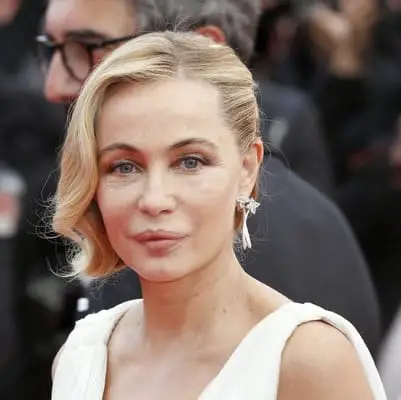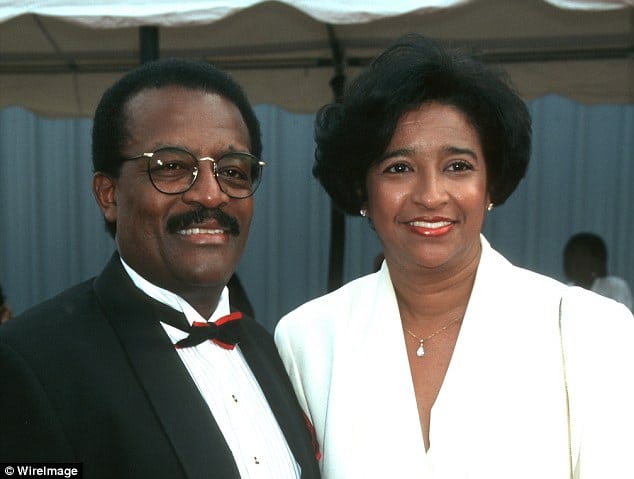Sylvia Kristel Biography
Sylvia Kristel (Sylvia Maria Kristel) was born on 28 September 1952 in Utrecht, Netherlands and died on 17 October 2012 in Amsterdam, Netherlands. She was a Dutch model and actress who appeared in over 50 films. She is best remembered as the lead character in five of the seven Emmanuelle films.
Sylivia Kristel Career
Kristel began modeling when she was 17 years old. She entered the Miss TV Europe contest in 1973 and won. She spoke Dutch, English, French, German, and Italian fluently, as well as several other languages to a lesser extent. Kristel gained international attention in 1974 for playing the title character in the softcore film Emmanuelle, which remains one of the most successful French films ever produced. After the success of Emmanuelle, she often played roles that capitalised on that sexually provocative image, most notably starring in an adaptation of Lady Chatterley’s Lover (1981), and a nudity-filled biopic of the World War I spy in Mata Hari (1985). Her Emmanuelle typecasting image followed her to the United States, where she played Nicole Mallow, a maid who seduces a teenaged boy in the sex comedy Private Lessons (1981).Another mainstream American film appearance was a brief comic turn in the Get Smart revival film The Nude Bomb in 1980.
Although Private Lessons was one of the highest-grossing independent films of 1981 (ranking number 28 in US domestic gross), Kristel reportedly saw none of the profits and continued to appear in movies and last played Emmanuelle in the early 1990s. In May 1990, she appeared in the television series My Riviera, filmed at her home in Saint-Tropez and offering insights of her life and motivations in an interview with writer-director Michael Feeney Callan. In 2001, she played a small role in Forgive Me, Dutch filmmaker Cyrus Frisch’s debut. In May 2006, Kristel received an award at the Tribeca Film Festival, New York, for directing the animated short film Topor and Me, written by Ruud Den Dryver. The award was presented by Gayle King. After a hiatus of eight years, she acted in the film, Two Sunny Days (2010), and that same year in her last acting role, she played Eva de Leeuw in the TV series The Swing Girls.
Sylvia Kristel Personal life
In September 2006, Kristel’s autobiography Nue (Nude) was published in France. The writing was translated into English as Undressing Emmanuelle: A Memoir, by Fourth Estate, 2 July 2007, in which she described a turbulent personal life that was blighted by addictions to drugs and alcohol, and her quest for a father figure, which resulted in some destructive relationships with older men. The book received some positive reviews.
She had her first major relationship with Belgian author Hugo Claus, who was more than two decades her senior. The union produced her only child, a son named Arthur, who was born in 1975. She left her husband for British actor Ian McShane, whom she had met on the set of the film The Fifth Musketeer (1979). They moved in together in Los Angeles, where he had promised to help her launch her American career. However, their five-year affair led to no significant career break for Kristel, but a relationship she describes in her autobiography as “awful – he was witty and charming, but we were too much alike.” She began using cocaine about two years into the relationship. This proved her downfall, although at the time she thought of it as a “supervitamin, a very fashionable substance, without danger, but expensive, far more exciting than drowning in alcohol – a fuel necessary to stay in the swing.” Sylvia Kristel also had a relationship with French singer Michel Polnareff.
Kristel was interviewed in 2006 for the documentary Hunting Emmanuelle. She described how she made a number of poor decisions due to an expensive cocaine addiction. One of those decisions included selling her interest in Private Lessons to her agent for US$150,000; the film grossed more than US$26 million domestically. After McShane, she married twice, first to Alan Turner, an American businessman. That marriage ended after five months, and she later married film producer Philippe Blot. She spent a decade with Belgian radio producer Fred De Vree, until his death.
Emmanuelle Movie 1974
Emmanuelle is the first installment in a series of French softcore pornography films directed by Just Jaeckin. The film’s story is based on the novel Emmanuelle.
Initial release: 26 June 1974 (France)
Director: Just Jaeckin
Featured song: Emmanuelle
Language: French
Based on: Emmanuelle; by Emmanuelle Arsan
Sylvia Kristel Mata Hari
The seductive World War I spy (Sylvia Kristel) does business with officers (Christopher Cazenove, Oliver Tobias) on both sides.
Initial release: 24 April 1985 (France)
Director: Curtis Harrington
Screenplay: Joel Ziskin
Producer: Rony Yacov
Music composed by: Wilfred Josephs
Sylvia Kristel Videos
Film
| Year | Title | Role | Notes |
|---|---|---|---|
| 1973 | Frank en Eva | Sylvia | English title: Living Apart Together |
| 1973 | Because of the Cats | Hannie Troost | |
| 1973 | Naked Over the Fence | Lilly Marischka | |
| 1974 | Emmanuelle | Emmanuelle | |
| 1974 | Julia | Andrea | |
| 1974 | No Pockets in a Shroud | Avril | |
| 1975 | Playing with Fire | Diana Van Den Berg | |
| 1975 | Emmanuelle II | Emmanuelle | |
| 1976 | Game of Seduction | Mathilde Leroy | |
| 1976 | The Margin | Diana | |
| 1977 | Alice or the Last Escapade | Alice Caroll | |
| 1977 | Rene the Cane | Krista | |
| 1977 | Emmanuelle 3 | Emmanuelle | |
| 1978 | Pastorale 1943 | Miep Algera | |
| 1978 | Mysteries | Dany Kielland | |
| 1979 | Tigers in Lipstick | The Lady on the Bed / The Unhappy Wife | |
| 1979 | The Fifth Musketeer | Maria Theresa | |
| 1979 | The Concorde … Airport ’79 | Isabelle | |
| 1980 | The Nude Bomb | Agent 34 | |
| 1980 | Love in First Class | Beatrice | |
| 1981 | Lady Chatterley’s Lover | Lady Constance Chatterley | |
| 1981 | Private Lessons | Mallow | |
| 1983 | Private School | Ms. Regina Copoletta | |
| 1984 | Emmanuelle 4 | Sylvia / Emmanuelle | |
| 1985 | Mata Hari | Mata Hari | |
| 1985 | Red Heat | Sofia | |
| 1985 | The Big Bet | Michelle | |
| 1988 | The Arrogant | Julie | |
| 1988 | Dracula’s Widow | Vanessa | |
| 1989 | Hot Blood | Sylvia | |
| 1992 | Silence of the Body | ||
| 1993 | Beauty School | Sylvia | |
| 1993 | Emmanuelle VI | Emmanuelle | |
| 1996 | In the Shadow of the Sandcastle | Angel Kelley | |
| 1997 | Gaston’s War | Miep Visser | |
| 1999 | Film 1 | Patron | |
| 1999 | An Amsterdam Tale | Alma | |
| 1999 | Harry Rents a Room | Miss Pinky | Short |
| 2000 | Lijmen/Het Been | Jeanne | |
| 2001 | Vergeef me | Chiquita (on stage) | |
| 2001 | De vriendschap | Sylvia | |
| 2001 | Sexy Boys | La sexologue | |
| 2002 | Bank | Wife | Video |
| 2010 | Two Sunny Days | Angela |
Television
| Year | Title | Role | Notes |
|---|---|---|---|
| 1981 | The Million Dollar Face | Brett Devereaux | TV film |
| 1987 | Casanova | Maddalena | TV film |
| 1993 | Emmanuelle | Old Emmanuelle | TV films |
| 1996 | De eenzame oorlog van Koos Tak | “Tante Heintje” | |
| 1996 | Onderweg naar morgen | Trix Odijk | TV series |
| 1997 | Die Sexfalle | Nicole Fuchs | TV film |
| 2000 | Die Unbesiegbaren | Elisabeth Lohmann | TV film |
| 2000 | Mind Hunter | TV film | |
| 2010 | The Swing Girls | Eva de Leeuw | TV film |
Sylvia Kristel Emmanuelle Filme
Emmanuelle is the first installment in a series of French softcore pornography films directed by Just Jaeckin. The film’s story is based on the novel Emmanuelle. Wikipedia
Initial release: 26 June 1974 (France)
Director: Just Jaeckin
Featured song: Emmanuelle
Story by: Emmanuelle Arsan
Music composed by: Pierre Bachelet
Emmanuelle 1974 Full Movie
Sylvia Kristel Hot Pictures
sylvia kristel
Sylvia Kristel Youtube
Sylvia Kristel Interview
By Mick Brown12:51PM BST 18 Oct 2012
The day that Emmanuel star Sylvia Kristel, who died aged 60, bared her soul to Mick Brown in 2007.
Sylvia Kristel has died at the age of 60. She starred in a series of notorious 1970s soft-porn films beginning with Emmanuelle (1974). Mick Brown met her in 2007 – and here is his moving interview:
You’re much better off as a love goddess to die around the age of 40.’ Sylvia Kristel tugs abstractedly at the silk scarf tied around her neck and gives a wry smile. ‘You save yourself a lot of trouble.’
As love goddesses go, Kristel was once at the very summit. By her account, some 650 million people have watched her gambol naked, simulate oral sex and fake orgasm in the film Emmanuelle – ‘that includes video’.
Writing of herself as a young and aspiring actress in her autobiography, Undressing Emmanuelle, she notes that ‘I wanted a seminal film – a springboard that would make me a worldwide name and fling wide the door to the movies and the life of my dreams.’ But quite how seminal Emmanuelle would prove to be even she could not have imagined.
Made in 1974, it was the film that supposedly made eroticism respectable – or at least a global commodity. The story of the bored wife of a diplomat tasting the fruits of sexual pleasure in the exotic paradise of Thailand (it is hard to avoid this sort of language when discussing Emmanuelle), it brought soft-core sex into the cinematic mainstream. A succès d’estime around the world, it ran in one cinema on the Champs-Elysées for nine years – a sort of French Mousetrap.
‘It became like a monument in Paris,’ Kristel says. ‘The Japanese were stuffed in the bus and then they were taken to the Eiffel Tower, Arc de Triomphe and Emmanuelle. In France, the feminists complained that Emmanuelle was a femme objet – an object of male fantasies. But the Japanese feminists were rather delighted with the film because they thought Emmanuelle was dominant, just because of this one scene where she climbs on top of her husband. That was the moment when all the Japanese women stood up and applauded.’
Kristel was 22 when she made Emmanuelle, a gamine, startle-eyed, fawn-like beauty, all long legs and pouting innocence. She is now 54. In the intervening years there have been two husbands and innumerable affairs; she has survived alcoholism and cancer, made a small fortune and lost it.
The figure that, as she puts it with commendable delicacy, once ‘stirred people’s dreams’, has now thickened into comfortable, almost matronly, middle age. The innocence has long since fled, but the ghost of beauty still haunts her face. She is dressed as if for the office, in a black trouser suit – elegant, worldly, but no sign of the vamp, if there ever was. ‘The vamp?’ She laughs. ‘No, that was never me.’
We are sitting in a small, scruffy but congenial cafe in a quiet corner of Amsterdam. Kristel lives in a flat upstairs – too small for visitors, and she values her privacy. The money she made from her films – like innocence – fled some years ago. She has now written her autobiography. More accurately she has had it written for her by Jean Arcelin, a sometime writer who, oddly, also happens to be the CEO of Chrysler Jeep Dodge in France.
Nothing in Kristel’s life appears to be straightforward. ‘He always wanted to be a writer, but his grandmother wouldn’t let him,’ she explains. ‘So now he is both a businessman and a writer. We would meet for lunch in these Michelin two-star restaurants. He was not one for the tape-recorder and he hardly made notes, which scared me very much. Then I would get 50 pages and I would cross out 30 of them with a red pencil. He was like a wild, untamed horse, but meeting after meeting, the story finally became mine.’
The tone of Undressing Emmanuelle is determinedly novelistic, life as drama. Kristel meditates on a difficult childhood, the pleasures and perils of sudden fame, the melancholic paradox of being desired by everyone but truly loved by very few. ‘No one has taken my heart in their hand,’ she writes at one point. ‘I haven’t given it… I have lent myself, rented myself out, but never given myself… I wanted to be looked at, and that’s all that ever happened.’
So reading it, I ask Kristel, would you think this was a person in control of their destiny or at the mercy of it? She gives the question some thought. ‘I think it’s a person who sits on a wave, like these surfers, they’re waiting for the perfect wave. And sometimes they crash.’
One of three children, she was born to wealthy parents who ran a hotel in Utrecht, Holland. At the age of 14 Sylvia walked into a bedroom to find her father and another woman in bed together. ‘I should have known,’ she says. ‘On the clothes-line on the balcony was a very frivolous pair of knickers; my mother’s were enormous.’ Her parents divorced shortly afterwards. ‘It was the saddest thing that ever happened to me.’
Her convent education proved unsatisfactory. Her father had left her mother with nothing, and as soon as she could Sylvia left school to earn money to support the family. She worked in a series of office jobs, but hated the routine and always dreamt of other things.
Her father’s betrayal, she says, ‘woke up this beast of ambition in me. It was something like, “I’m going to show my father and his second wife. I’m going to be real famous – so famous that now they will send me a card, a letter, whatever.” This didn’t work the way I had planned it. But anyway I was on a train and I couldn’t jump off. What is it they say? Be careful of what you wish for.’
When she was 20 her mother encouraged her to enter a beauty contest, Miss TV Holland, which she duly won. She came to London for the European finals – ‘presented live by the well-known Katie Boyle,’ she notes in her book – which she also won. The Dutch prime minister sent a congratulatory telegram.
By now she had acquired a lover, Hugo Claus, a Belgian artist and writer 27 years her senior, and the beginnings of a film career. Kristel played the leader of a gang of rebellious girls in a Dutch film called Because of the Cats – ‘a type of Clockwork Orange,’ she remembers, ‘very violent and sexually explicit at a certain point.’ In another she played a model – ‘I just had to walk around and stand naked under a shower.’ In a third she played a singer, who in the climactic scene had to escape by climbing over a fence naked. (The film was called Naked over the Fence, so it seems that somebody had to be.) ‘It was shot very elegantly,’ Kristel insists. But a certain theme was beginning to emerge.
In 1974 she was approached by the film producer Yves Rousset-Rouard, who had acquired the rights to the book Emmanuelle. Written in the 1950s by a French-Eurasian woman named Marayat Rollet-Andriane, the wife of a French diplomat (but published under the pseudonym Emmanuelle Arsan), the book purported to be a quasi-memoir of her sexual experiences in Thailand. (It was later rumoured that it had actually been written by Rollet-Andriane’s husband.)
Inspired by the success two years earlier of Last Tango in Paris (starring Marlon Brando, Maria Schneider and a quarter of a pound of butter), Rousset-Rouard envisioned Emmanuelle as an erotic art film for a popular audience. The cast included Jeanne Colletin, an actress from the Comédie-Française, and Alain Cuny, a well-known film star in France. The poster showed Kristel sitting topless in a wicker chair, coyly fingering a string of pearls. It was captioned ‘At last – a film that won’t make you feel bad about feeling good’.
Writing of her preparation for the role, Kristel rhapsodises that ‘beneath the closed eyes of ecstasy will be born an unreal, intimate world of fantasy… I will send out contradictory messages, creating a fertile, unsettling, vast space in which every person, every memory, every desire will find its place.’
Well, sort of. The pleasure-seeking Emmanuelle joins the ‘mile-high club’, engages in some soft-core fumbling with two other women and is initiated into troilism by the ageing sensualist Mario (played by Cuny). All of this is shot in soft focus, interspersed with travel-brochure footage of the Thai countryside and glamorous diplomatic parties – ‘like the world of Peter Stuyvesant or something,’ Kristel says. ‘Jet-set life.’
‘I can’t say it’s a brilliant film, really,’ she admits. ‘But it was the right time.’
Looking at it now, it is hard to imagine the scandal that Emmanuelle caused, or that it should have become such a success. It barely passes muster as a travelogue, let alone as erotica. Its creaking pseudo-libertarian platitudes – ‘love is the search for pleasure’ – seem as outmoded as the men’s Zapata moustaches. The most scandalous things about the film are its attitudes – the implicitly colonialist view it takes of Thais (who are portrayed variously as servants, sexual playthings and putative rapists) – and the particularly distasteful scene where Emmanuelle is offered up as the prize to two competitors in a Thai boxing match. Kristel still shudders to think of it. When the scene was first presented to her as a crucial part of her character’s ‘education’, she says she attempted to argue with the director Just Jaeckin that no woman would find being raped enjoyable. ‘But it was very hard to explain that to a male director. He said, “Yes, but it’s in the book.” It was a very humiliating scene, and very difficult for me.’
Kristel was paid $6,000 to make Emmanuelle. Not a lot, she admits, ‘Although I’d never been to Thailand, and we stayed there for three months. It was very nice.’ She had signed a contract for three films. When it became apparent that Emmanuelle would be a huge success, the most she could do was ask for a raise. ‘And Yves said, “Yes, I understand that.” ‘ For the sequel, Emmanuelle: The Joys of a Woman, the following year, she received about $100,000.
In her book she writes of a telling moment when she was about to simulate oral sex on the actor playing her husband, and confesses that she has forgotten her lines. ‘Say whatever you like,’ Jaeckin tells her. ‘You’ll be dubbed anyway.’
‘This role I had imagined as a springboard shrank me for good,’ she notes in the book. ‘My body was more interesting than my words.’
A deeply dispiriting realisation, I suggest. She shrugs. ‘I wasn’t Sarah Bernhardt, for God’s sake. So it went fine.’
How does she now regard Emmanuelle – with affection? Gratitude? Loathing? Weariness? ‘That kind of sums it up,’ she says, and laughs.
And to have stirred people’s dreams?
She blanches slightly. ‘Yes – thank God, I didn’t feel it so that way at the time. Later I came to realise that, but at the time it was just some mist, some cloud of being famous. I didn’t want to think too much of this Emmanuelle thing or whatever it implied; I just wanted to move on.’
By the time the second Emmanuelle film was made, Kristel had given birth to a son, Arthur – her only child – by her lover, Hugo Claus. She went on to make films with Roger Vadim and Claude Chabrol, and to co-star with Gérard Depardieu in René La Canne (1976). But none of these ‘normal’ films, as she puts it, was a success. ‘I was disappointed and a little hurt,’ she writes. ‘I was dressed but people preferred me naked. I realised that the public had been deeply affected by Emmanuelle and wanted to prolong their fantasy, to keep me within it, symbolic and naked, idealised and necessary.’
Hollywood provided a clean slate, an opportunity to keep her clothes on. Emmanuelle had not been seen in America. ‘Maybe New York – but it didn’t have a big impact, for instance, in the Bible Belt.’ In Airport ’79 she played an air stewardess, wearing a uniform improbably split to the thigh, enjoying an affair with Alain Delon (who was obliged to utter the immortal line ‘Your hair is in my French fries’). In Private Lessons (1981) she played a housemaid seducing a 15-year-old boy. The film took $50 million in the United States alone, her biggest hit after Emmanuelle.
By this time Kristel was deeeply embroiled in a relationship with the British actor Ian McShane, whom she had met in 1977, when both were working on a film called The Fifth Musketeer.
‘I knew he was a predator,’ she writes in her book. ‘I am the perfect prey – I like being bitten into.’ Well, up to a point. By the time the affair ended four years later, she recounts, she had hit ‘rock bottom’. The best thing about their relationship, Kristel writes, was ‘bed and breakfast’ – being served beans on toast by a naked McShane.
Their rows were volcanic. McShane, she seems to feel, resented the fact that she had become an international movie star by dint of ‘luck and a nice arse’. ‘Well, what he actually said was I couldn’t walk and talk at the same time – and indeed, I have a lot of trouble doing that.’
His agent, she writes, told her that if McShane had been three inches taller, ‘he would have had a career as glittering as Sean Connery’s’. He won’t thank you for that, I say. Kristel shrugs. ‘He knows it. It’s a shame.’
In the French edition of the book Kristel took care to cloak McShane in a pseudonym, ‘Ben’. But her British publishers insisted she use his real name. ‘So I thought, “Why not?” I’m very open about my own life. And I believe what I’ve said about him is absolutely true. He wasn’t a sweetheart, what can I say?’ She pauses. ‘I could have been more positive about his cooking, perhaps.’
The major problem was drink. McShane, she says, could be very funny and very charming, ‘but it was like Dr Jekyll and Mr Hyde. With alcohol he would become a totally different person.’ Kristel herself was evidently no slouch in that department. Her first taste of cognac at the age of 11 had given her an early enthusiasm for alcohol, and after the success of Emmanuelle, Dom Perignon on set became a contractual requirement. Los Angeles was ‘a boring city’, she says, and drink offered some distraction. When I ask which street she lived on she identifies it by its proximity to the nearest Liquor Locker store.
But it was with cocaine that she really went off the rails. She thinks it was a lawyer, or possibly an accountant, who first extolled its virtues to her, ‘and I thought it was wonderful! A great discovery! And from that point on I was hooked for a couple of years.’
All day and every day?
‘No, no! Just when you get up. And when you go to bed.’ She pauses – ‘and in between’ – and laughs. She is a good sport.
Her affair with McShane came to an acrimonious end when she became pregnant and then miscarried. A marriage to an American businessman lasted just five months, and Kristel threw herself into Hollywood Babylon. ‘The parties are many, similar,’ she writes. ‘I snort, I slip on my silk-lined Chanel clothes, drink and fall over.’
One of her friends was the singer-songwriter Harry Nilsson, a legendary boozer and drug fiend. ‘With Harry,’ she says wrily, ‘I was like Mother Superior’ – which gives some indication of Nilsson’s Herculean approach to consumption.
It was a platonic relationship, she says, ‘although thinking about it, we hardly talked at all. He would come round with his collection of pornography and ask whether he could watch it on my VCR -‘ she arches an eyebrow ‘- which I thought was very charming.
‘And then,’ she remembers, ‘my accountant said, “Do you want to continue with this hobby and sell the house? Or do you want to sober up?” And I said, “I’ll sober up.” ‘
The more Kristel talks, the more you find yourself warming to her. She is winningly candid and unapologetic about herself, devoid of any airs or pretensions – someone who has come to regard the switchback journey that life has taken her on with a droll sense of humour and, more importantly, a sense of proportion. While it is true that as an actress she was never able to escape the blessing and curse that was Emmanuelle, she was able to make a career of sorts. ‘There was one director who said I was the type of actress who loses interest after three weeks, and that’s true,’ she admits. ‘It’s very boring to sit on a set and wait until it’s finally your turn. But I know now that no film could have beaten Emmanuelle, box-office wise or in its impact. I got a lot of letters from people – “You saved our marriage” – and so…’
Being a love goddess suggests a kind of wantonness, a delerious surrender to the ecstasies of the flesh. But that, she says, was never the case. If anything, she was rather demure. She never believed the platitudes of Emmanuelle – that life should be a single-minded dedication to pleasure. ‘My mother was Protestant,’ she says, ‘and in her mind life was more about work and obligations and responsibilities. I think I’ve been responsible.’ She stops and thinks on this. ‘Most of the time.’
Which is not to say that she was immune to romantic diversions. As well as McShane, there were affairs with Vadim, Dépardieu and Warren Beatty – a triumverate of experiences that she remembers with a laugh as ‘definitely not unpleasant’. But, she adds, if you work on a film, as she did with Vadim and Dépardieu, ‘romances tend to happen’; and she hesitates to describe her dalliance with Beatty as an affair.
‘I don’t know if he had affairs,’ she muses. ‘He had conquests, I think. With Warren it’s very complicated. I don’t know which is more sexy – his physical being or his inner brilliance. I would have loved it if he had taken me seriously at that point, but he told me that I reminded him too much of his sister. And he said it in a way that made me think, “Oh boy, it doesn’t look like they see each other that often.” ‘
When I tell her that she resembles the woman Beatty later married, the actress Annette Bening, she shoots me a glance. ‘Well, that’s a nice solace.’
When her movie career in Los Angeles finally petered to a close in the late 1980s, she returned to Europe. She had taken up painting, and exhibited in LA, Brussels and Amsterdam. She was relatively wealthy. And then she met Philippe Blot. A paparazzi photographer with ambitions to make films, he presented himself with two secretaries and a composer, proposing she listen to the soundtrack for a film that she would star in.
‘I thought, “Wow, this guy definitely has some panache.” He invited me and my mother to come to Paris to discuss the script and to introduce me to his financiers. I accepted his film and we flew to Las Vegas. Then one financier quit the project. And I thought it would be more practical to get married after that.’ Get married? Was she in love with him? ‘Not really. I thought he was very charming. I don’t know what occurred to me.’ She pauses. ‘I don’t even remember, was he the first or the second husband?’
The second, I think.
‘Ah, yes. So I figured, “Let’s do this with reason.” The good news was that Philippe had two sons whom he loved very much. I thought it would be perfect for my own son. So that was the idea behind it.’
Her friend the producer Menahem Golan of Cannon Films provided the financing for Blot’s first film with Kristel, The Arrogant. ‘This was at the time when Menahem produced maybe 200 movies a year and read the script for maybe 20 of them. So our script was approved without him even looking at it – luckily, because otherwise he would never have done it. It was terrible.’ (According to one critic, it was an ‘absolutely baffling motorcycle movie.’)
‘So – so far the marriage had gone well, and it hadn’t cost me a cent.’ Then things began to go wrong. At the time, she and Blot were living in St Tropez, ‘and – how do you call these people who knock at the door?’
Jehovah’s Witnesses?
‘If only they had been! No, debt collectors.’
All the money from her next film, Dracula’s Widow, went towards settling Blot’s debts. In no time at all she had lost everything. But hey, it’s only money, she says. By now she was past the point where she could rely on a big part to recoup her losses. Instead she was obliged to do another Emmanuelle film to find cash. ‘Number seven, I believe… Actually, a very interesting script. I was a kind of madam of some organisation that could organise all your erotic fantasies into virtual reality. And all the youngsters had to do the sex scenes; I was always in a business outfit. Yah, so…’ She laughs at the absurdity of it all.
There were a few film roles after that, but for the most part she painted. For 12 years she lived, very happily, with a Belgian radio producer, Freddy de Vree, until his death in 2004. Kristel herself had been diagnosed with throat cancer two years earlier; a programme of radiation and chemotherapy seemed to arrest it, and then she discovered the disease had spread to the lung, necessitating an operation. ‘It still hurts when it rains,’ she says with a sigh. ‘And also it’s very ugly. It’s so stupid, I said I don’t care what it looks like, I’m not vain. But it looks like they had Ray Charles sew me up.’ She laughs. ‘That’s one of McShane’s lines – who designed that dress? Ray Charles? He could be very witty.’
Her doctor has now given her the all-clear. ‘I behave. Some discipline is required. I don’t smoke. About alcohol they say I can have three units a day – and I don’t drink every day. As you get older you cannot drink as much as you used to, because it takes too much to recuperate – and the wrinkles…’ She sighs. ‘Now I’m getting older. Very much older. It’s different for a man. A man can produce children almost until he dies. But females are finished at a certain point. And it shows. I could do some cosmetic surgery, some adjustment to the face, but I doubt if it would make me feel more fertile…’ Her voice trails into silence.
The cafe is beginning to fill up now. An elderly man with a battle-scarred face stops at our table to say hello. ‘My landlord,’ Kristel says. ‘He used to be a champion boxer.’
We adjourn to a Japanese restaurant for dinner. She orders sake. Three units a day, and she has not drunk for three days, which means nine units in credit. Another sake then. Are you a contented person, I ask.
‘I’m a very contented person. I have a talent for happiness. I look with the eyes of a painter, and I see beauty. It may be easier.’
Money has been tight. There have been interviews with Japanese and Canadian television – ‘four days’ work, they pay me, so I can live for a couple of months’. A little commercial work as an artist. A couple of years ago she directed an animated film, Topor and Me, about the artist friend who had first encouraged her to paint. It was shown to great acclaim at the Tribeca Film Festival in New York. ‘But I don’t need extraordinary wealth any more. I’m very happy as it is, to be able to pay my bills. That’s fine.’
Sylvia Kristel shrugs. ‘I think it’s nice to live in an empty place, so you can collect your thoughts. So I’ve got rid of all clutter. Not necessarily only in my living-room, but in my head.’
This is what happens in life. Disease teaches you what is important. You modify your expectations and your needs. ‘I have no expectations,’ she says.
But for the book to be a success would surely help, I say.
She sighs. ‘From your mouth to God’s ear…’
Sylvia Kristel Private Lessons
Teenager Phillip Fillmore (Eric Brown) is out of school for the summer, his millionaire father is out of town on business, and he’s got the mansion to himself, with the sexy Dutch maid Nicole (Sylvia Kristel) to keep him company. It sounds like a dream summer, until Nicole starts acting strangely familiar toward Phillip, who isn’t quite sure how to react. Meanwhile, chauffeur Lester (Howard Hesseman) seems to have something up his sleeve as well, which doesn’t bode well for poor Phillip.
Initial release: 28 August 1981 (USA)
Director: Alan Myerson
Music composed by: Willie Nile
Based on: Philly; by Dan Greenburg
Box office: 26.3 million USD
Sylvia Kristel Cause Of Death
To millions of men, Sylvia Kristel will forever be the girl who inspired their first boyhood fantasies. The film actress caused a global sensation in 1974 with the title role in Emmanuelle, about a promiscuous housewife. It was one of mainstream cinema’s first erotic movies. But today – 38 years and countless dreams later – many of the 650million fans who have seen it were in mourning after its glamorous star died, aged 60.
The Dutch actress had survived cocaine addiction, alcoholism, throat cancer, a stroke and also a string of doomed love affairs. She owned homes in glitzy locations across the world – but lost them all after going broke. The screen legend ended her days in a small flat above a cafe in Utrecht, Holland.
“Sylvia died in her sleep on Wednesday night,” agent Marieke Verharen said today.
And the film’s director Just Jaeckin said: “I am very sad. She was like a little sister.
Sylvia Kristel Julia
A German playboy (Jean-Claude Bouillon) helps his son meet women (Sylvia Kristel, Terry Torday) in Italy and Switzerland.
Initial release: 13 September 1974
Director: Sigi Rothemund
Screenplay: Wolfgang Bauer
Producer: Erich Tomek
Music composed by: Gerhard Heinz






